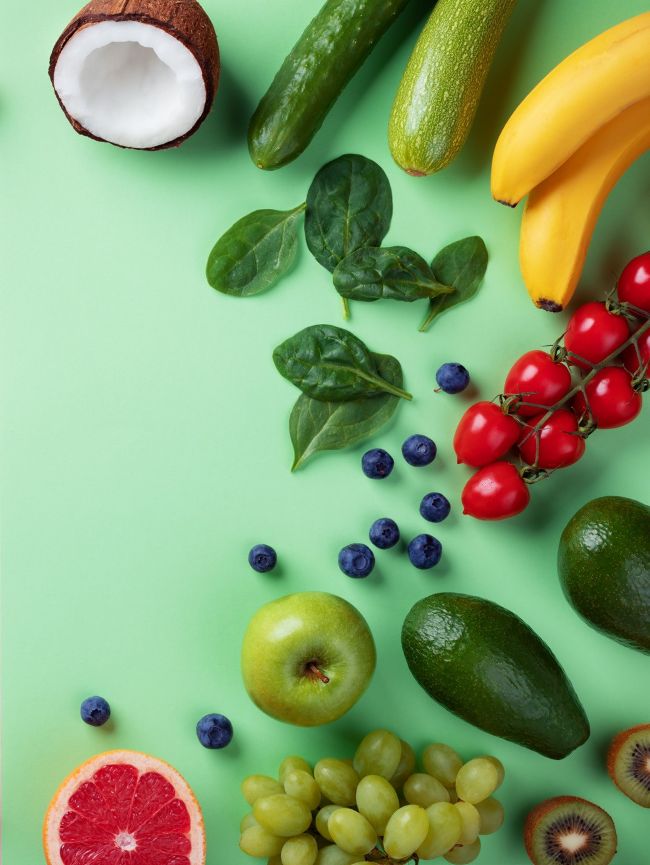THE ANTIINFLAMMATORY DIET
We asked leading dieticians, Kim Hofmann and Ané Smith, how an anti-inflammatory diet affects the ageing process and the skin

Image from Shutterstock
“
The
MOST
COMMON INFLAMMATORY FOODS
are
REFINED CARBOHYDRATES, ADDED SUGAR,
saturated and
TRANS-FATS,
as well as
PROCESSED
and
ULTRA-
PROCESSED
foods.
”
When did the concept of inflammatory foods start being used in the nutritional sphere?
Inflammation is part of many diseases including cardiovascular disease, cancer and diabetes. With this knowledge, observational studies as well as controlled feeding trials were undertaken, and they demonstrated that dietary strategies can influence the inflammation. Thus the anti-inflammatory diet was introduced around 2000 by Dr Andrew Weil MD and has become popular over the past two decades.
Please provide a definition of inflammatory foods.
Inflammation occurs when the immune system is activated. When this happens, the body releases chemicals and immune cells, which cause inflammation. The immune system gets triggered when the body has to fight against something that is harmful (or thought to be harmful) to it. Any food that causes the activation of the immune system is known as an inflammatory food.
Which foods are associated with inflammation?
The most common inflammatory foods are refined carbohydrates, added sugar, saturated and trans-fats, as well as processed and ultra-processed foods. Also foods that are low in natural nutrition (vitamins, minerals, antioxidants etc.) and fibre.
What effect does sugar have on the digestive system?
While sugar is definitely one of the inflammatory foods, we need to remember that a single inflammatory food isn’t going to cause problems. It is the accumulation of inflammatory foods where problems start showing. A good way of looking at it is the dietary pattern. If you eat a diet rich in vegetables and fruit and the occasional bit of sugar, an inflammatory response is not likely. But if you eat a diet that is low in vegetables and fruit and high in added sugar, an inflammatory response is very likely.
Does sugar cause the gut to swell?
This is not due to the inflammation per se, although some swelling around inflammation is normal. Large amounts of sugar in the colon causes water to be drawn into it, which can lead to bloating.
Does sugar break down collagen in the skin?
Sugar does have an effect on ageing the skin and can play a role in the development of wrinkles. It combines with the collagen fibres, which make the collagen difficult to repair and thereby can enhance ageing. However, this only occurs when there is excess sugar in the system, and the affect of sugar on skin is small in comparison to other environmental factors (UV light/sun) and genetics.
Practically all foods eventually turn to sugar in the gut but do they all necessarily result in the inflammation associated with actual sugar?
All carbohydrates (fruit, milk, yoghurt, legumes, starchy veg, starches, breads, crackers, cereals and many treats) will convert into sugar in the body. This sugar then moves into the blood and from there into the cells for usage or into storage when not needed. When blood sugar levels are kept stable, the sugar does not have a negative effect on health. It’s when blood sugar levels are high that problems start occurring.
The amount of nutrition in the food also plays a role. When lots of nutrition is present (i.e. vitamins, minerals, phytonutrients, antioxidants), the body is able to neutralise the negative effects of substances (free radicals) that cause deterioration of the body. Vegetables and fruit can therefore ‘undo’ the negative effects of inflammatory foods.
How do inflammatory foods impact the natural ageing process?
When the dietary pattern contains large amounts of inflammatory foods and not enough nutrition, a chronic low-grade inflammation is present in the body. Inflammation becomes dangerous when it persists at this low level, as it is associated with immune dysregulation, can damage healthy tissues and fuel diseases, and may even damage DNA. This affects the natural ageing process of the body.
Why are inflammatory foods bad for the skin?
Inflammation induced by chronic, persistent underlying inflammation accelerates the natural ageing process, causing skin to become dry, dehydrated and inflexible, resulting in fine lines and wrinkles. The skin’s defence system is depleted, resulting in the weakening of the structure of the skin, degradation of collagen and elastin, and impairment of the barrier function of the skin. This results in the skin cells being damaged and so skin ages at an accelerated rate.
If I were a skincare therapist treating a client who was concerned about ageing skin, what would I advise regarding their diet?
There is limited (if any reliable) research that’s been done on the correlation between ageing skin and diet. As stated previously, we know that our diet and inflammation, especially low grade chronic inflammation, plays a big role in our body’s ability to heal and keep the skin hydrated, flexible and plump. Therefore, it’s important for us to look at our nutrition as a whole, and make sure that we are getting a balanced diet, because it’s the accumulation of inflammatory foods which causes overall inflammation, not just one item of food. A balanced diet includes starches (wholegrains, starchy veggies, cereals, breads etc), milk and dairy products, plenty of fruit and veggies, proteins which include fish, chicken, legumes, eggs, cheeses and on the odd occasion, red meats, and fats. The latter includes olive oil, nuts and seeds, avocado etc. It’s essential for the body to receive this balance to ensure it has sufficient energy and nutrition so that it can keep healthy and heal itself from the inside out.

Image from Shutterstock
“
It’s
VERY IMPORTANT
to stick to
SCIENCE AND,
if you’re not sure,
ASK YOUR HEALTHCARE PR ACTITIONER
(dietician!)
R ATHER THAN
following what
SOMEONE
who
IS NOT QUALIFIED
has advised on
SOCIAL MEDIA.
”
The anti-inflammatory diet is definitely a hot topic at the moment. We see it all over social media, Instagram, TikTok etc so it’s very important to stick to science and, if you’re not sure, ask your healthcare practitioner (dietician!) rather than following what someone who is not qualified has advised on social media. That information is not necessarily accurate and it is definitely not catered to your specific needs.

Kim Hofmann

Ané Smith
This article was penned by Kim Hofmann – BSc med (Hons) Nutrition and Dietetics & BSc (Hons) Psychology and Ané Smith – BSc (Hons) Dietetics, both of whom practice at Kim’s Nutrition. Their main objective is to teach people how and what to eat to ensure that their body is working at its best. They work with balanced and intuitive eating and individualise the plans and journeys for each and every person. Hoffmann and Smith work with weight loss, disordered eating, eating disorders, chronic diseases of lifestyle (diabetes, heart disease, blood pressure), gut health, women’s health, and paediatric nutrition. Their main interest is the psychology behind eating.